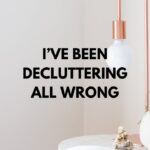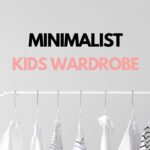This post may contain affiliate links, meaning I make a commission if you purchase through my links, at no extra cost to you. Disclosure here.
What to do with those ‘just in case’ items?
You get excited when you start decluttering, and then you find yourself faced with too many decisions that you have to make about every single item that you have.
Soon enough, you start wondering, “Well, why don’t I just keep this one? I haven’t used it in 3 years, but I should keep it ‘just in case’ we need it further down the line”.
It is so easy to justify keeping lots of items ‘just in case’, isn’t it?
We feel like there might be this unpredictable event where we suddenly realise we need this one item that we have been holding on to for 5 years and haven’t used once.
Hi, I’m Madeline. If you’re new around here, I make videos and I write articles about minimalism.
I have been on a minimalism journey for over a year now.
We have decluttered so many things from our house, and I’m excited to take you along. Maybe we can declutter together and get back more of that calm space in your home.

Have you watched the “The Minimalists: Less Is Now” documentary on Netflix?
In it, it was mentioned that the average household in the US has 300,000 items in it. And to think that we use 80% of things 20% of the time.
That means that, on a regular basis, we are using a really small amount of stuff that we own.
So why is it so hard to part with all of the unused things?
Feel free to watch the video or keep reading below:
Your self-worth is not in your stuff
A reason is that a lot of the time, even without realising it, we do connect our self-worth to our stuff.
For example, maybe we have this huge collection of books that we feel like we need to keep because it proves our self-worth.
Because subconsciously, sometimes we just want to tell the world that we are well-read and smart and that we have things to talk about with our friends or people who come over.
The truth is, we don’t need to do that.
And you don’t have to hold on to that stuff to prove anything to anyone. Your self-worth is not about your stuff.
You can be well-read, have a lot of knowledge, and be somebody who has a lot of smart topics to talk about.
That doesn’t mean you have to have a huge library of books in your home to prove it.
Of course, if having lots of books makes you happy, nothing wrong with that.
I learned about this in the book ‘Goodbye, Things’ by Fumio Sasaki.
This is a book I highly recommend as it can really help you let go of stuff that you don’t actually need or don’t use anymore.
Do we really need more space?
Oftentimes, we feel like we need more space.
I felt this for years.
I felt like the problem with the stuff that was around me, feeling overwhelmed and stressed about tidying and cleaning and organising, was due to the lack of ‘the right organising system’.
If I could just find the right organising bin, the right storage basket, or just the right system, then everything would be tidy and perfect.
Or maybe if I had a bigger house or just more storage space, that would solve my problem.
I soon realised that just getting more space in my home or more storage space doesn’t solve the problem.
We used to live in a small flat in London. We didn’t have a lot of stuff in there because you couldn’t fit it in.
But then we moved to a bigger house that had a garage for storage, a shed, and a loft. And soon enough, all of those spaces started getting filled up.
So I thought, “Wow, we actually need a bigger house to fit all of our stuff”.
Yet as I have been decluttering, I realised that, no, actually, it’s not the space!
Because no matter how much space we have, we are more likely to just fill it up with stuff, unless we become conscious about decluttering and getting rid of things as well.
It’s not about not having enough storage space – it’s just about having too much stuff.
Negative talk from our stuff
Another thing that Fumio Sasaki talks about in his book is the negative talk that our stuff has towards us.
And this is something I’ve also come across in the videos created by “The Minimal Mom”, Dawn. I find her so inspiring, and she also says, ‘Your stuff is bullying you’.
You might not even realise it, because it’s something that happens constantly.
You know when you just walk around your home and you don’t even consciously think about it, but you notice…
‘Oh, that blanket needs to be tidied up!’
‘Those toys need to be put away…’
‘I need to take those clothes to donations.’
‘Oh, wow, I bought that crafting set, and I haven’t done the crafts I said I would…’
‘I got that hobby I haven’t done in ages!… I’m just such a lazy person…’
‘I got this gym gear, and I’ve never even been to the gym. I’m such a failure!’
I used to have jeans from before having a baby, and looking at them used to make me feel like, ‘Oh, I haven’t lost the baby weight yet’.
We have all of this negative self-talk in our heads, and we don’t even realise it.
All of this stuff that we have and keep ‘just in case’ can actually have such a negative effect on us and our mental health.
It can make us feel bad about ourselves, it can make us feel like we’re inadequate, like we haven’t done enough, like we need to be doing more.
The truth is, we just need less.
You don’t need to keep all of that stuff.
You can just let go and embrace the version of you that you are right now and keep the stuff that you value in this season of your life.
The 4 Questions to Declutter Just-in-Case Stuff
When I’m decluttering the ‘just in case’ stuff, I have four questions that I like to ask myself.

Question #1: the Value Question
The first question is:
‘Is this stuff something that I actually need and value, is it bringing value to my life, or is it just clutter?’
And I know, it’s hard sometimes to be objective about this.
We do sometimes have emotional attachment to our things. But I think it’s really important to ask ourselves this question and try to be honest with ourselves.
The next three questions are a bit more practical, and they helped me a great deal to declutter my stuff.
Question #2: The Fire Question
The second question to ask yourself is:
‘If there was a fire, and I did have the time to save some items, would I save this item in a fire?’
If not, I probably don’t really need it.
Question #3: The Moving Question
The third question is:
‘If I was moving and I had to pack up my entire house, and I had to put this item in a box, wrap it up nicely so it doesn’t break, take it to the new home, unpack it, put it on a shelf… would I take it with me if I moved out?’
If the answer is no, then I don’t need to keep it, regardless if it was a gift, regardless of my intentions when I bought it.
We all make mistakes when it comes to purchasing things.
But it’s pointless beating ourselves up about this for years and years and keeping that item just because we bought it on a whim or because it cost us money at some point.
If it doesn’t bring you value, you have permission to let it go.
Question #4: The Lost Question
The fourth question, and I think this is my favourite one, is this:
‘If I lost this item, would I replace it at full price?’
If the answer is no, I don’t need to keep that.
And I found that for a lot of items in my house before decluttering, I would answer with “no” to these questions.
For example, if I lost a little trinket that I had, I would surely not replace it.
I don’t even need it, I don’t have any value for it, and I can just let go of it.
How to avoid decluttering regret
Now, I know you might be going through this process of letting go of those ‘just in case’ items, and the main thing that comes up for us in this process is the fear of having regrets afterwards.
We fear that we’re gonna let this item go and then 2 months from now we’re gonna realise that we needed it.
Personally, I have been decluttering for the past year.
I’ve gotten rid of so many things, I lost count of them!
And to be honest, I haven’t missed a single one of them yet.
I didn’t even know half of the stuff we had in our garage.
What’s more, I can’t even remember half of the things I got rid of. And this is because they just didn’t bring value to me, so there was just no point in keeping them.
So I would say that 99% of the time you are not going to regret anything that you got rid of because it wasn’t valuable to you in the first place.
But let’s assume that you realise, ‘Oh, I actually really needed that spatula, that’s special for pasta,’ – is there maybe something else in your kitchen that you could use instead?
And if you realise that you got rid of something that you really, really need, maybe you can go and repurchase it again, new or second-hand.
So it’s not like you’ve lost all this money by decluttering, and now you have to buy everything again.
It’s not going to be like that.
It’s very unlikely that you’re going to miss any of the items that you got rid of.
In reality, we spend more money repurchasing things that we already have somewhere in all the clutter but we can’t find them, we don’t know where they are, or we forgot we had.
It’s so easy to bring things into the house, and it’s so hard to let things go.
But we have online shops and countless stores around us.
We can always go and buy things, and a lot of the items that we have are low-value items.
So it wouldn’t cost you a lot of money to replace it if you really, really needed it.
The Decide-later bin
And if you feel like, “Yeah, that sounds good Madeline, but I’m still struggling to let go of those ‘just in case’ items”.
Here’s something that might help you: get a quarantine bin or a ‘decide-later’ bin.
Basically, a box, a bag, a storage bin etc.
When you are decluttering and you’re not sure about an item, thinking ‘Oh, I might want this just in case, I might realise I need it further down the line,’ take the item, and put it in the quarantine bin or decide-later bin.
If you’re not ready to part with it, that’s fine.
We need to be gentle with ourselves in this process. It can take a lot of emotion, and there’s a lot of decision-making that goes into this, which can be exhausting.
So just get that decide-later bin, put stuff in there that you want to keep ‘just in case’, and see if you miss it.
See what it feels like to live with less stuff.
See if it makes your life easier.
And then if 2 months down the line, you realise, ‘Oh, I actually did need that spatula,’ you can go and grab it from the decide-later bin.
I’ve actually done this a few times with my son’s toys when he was a bit younger.
I wanted to see if he remembered them, or if he asked for them. If he had, I would have brought them back in.
But he couldn’t even remember what was in the ‘quarantine bin’, and neither could I, because it was stuff that no longer had value for him.
And if you have that ‘decide-later’ bin or box, and 3 months later you realise that you actually haven’t needed anything from it, you can just go ahead and get rid of it, sell it or donate it.
Clutter means stress
One thing I feel is really important to remember in this process is that clutter equals stress.
Don’t choose things over your mental health.
I have personally realised that my mental health is so much more important than the stuff that is in my home.
We always say, ‘It’s not about the things, it’s about the people in our life.’
So we say that this is our priority, but then we keep all of this stuff, and we keep bringing stuff in. And in the end, what we say and what we do don’t really match!
Don’t get me wrong, I used to do that too!
I used to spend so much time tidying, decluttering, and organising, trying to keep my house tidy.
But I realised I didn’t want to spend my time doing that.
I don’t want my kids to remember a mum who was constantly stressed about tidying up.
I want to have time for my kids, to spend it playing with them and going on adventures together.
And I want to be free of this stress that was in the back of my mind, ‘I need to get home and clean up the house.’ I don’t want that. I want my family to be my priority.
I hope this was helpful if you’re struggling with those ‘just in case’ items.
Let me know what else I can help you with, and what you’re struggling with right now with decluttering.
I would love to hear from you in the comments!




